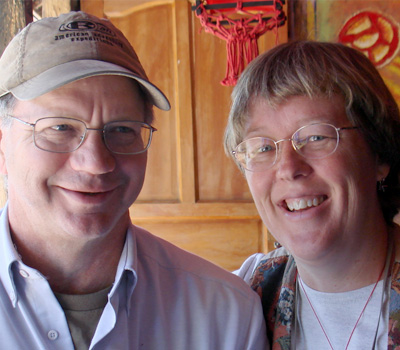Investigations into how genetic diversity affects the spread of disease
Infectious diseases have an incredible affect on humans directly through our own health as well as infections of agricultural crops. It is therefore necessary to understand what factors contribute to the spread of infectious diseases to improve human and agricultural health. The research of Dr. Lynda Delph and Dr. Curtis Lively, of Indiana University, does just that. Their combined theoretical and experimental approaches merge epidemiology with evolution in a way that provides insight into infectious diseases. By merging their interests, they can focus on a simple underlying theme: how does genetic diversity affect the spread of infectious disease in natural populations? Dr. Delph and Dr. Lively's laboratories are located side-by-side making collaboration easy. However, perhaps more unique, is that in addition to being collaborators, they are also married. Therefore, their career-long collaboration has supported innovative and rigorous scientific breakthroughs.
Using the plant, Silene latifolia, Dr. Delph looks at why males and females are so different from each other and why populations of this species also differ in many ways, including the extent to which they are infected by disease. Using a freshwater snail from New Zealand, Dr. Lively looks at why two different types of females, one that mates with males to produce genetically variable offspring, and asexual females that produce genetically identical clones of themselves, are able to coexist in nature when disease is present. The combination of their systems and studies allow this collaborative couple to understand various diseases. Dr. Lively has produced mathematical theory that combines epidemiological models with evolutionary models that makes specific predictions about how genetic diversity alters the spread of disease. The researchers plan to use both the plants and snails to experimentally test how having genetically diverse populations can slow or halt the spread of disease. The combination of using epidemiological and evolutionary frameworks to theoretically and experimentally investigate tractable systems is extremely rare and offers a new perspective to understanding disease spread.
Current research includes:
-
Dr. Lively: Dr. Lively's research is focused on understanding what selects for genetic diversity in hosts and parasites. His research has suggested that increasing genetic diversity in hosts decreases the spread of disease. Therefore, his research has applications in human disease, crop plants, conservation biology, and dealing with inbred populations.
-
Dr. Delph: Dr. Delph has been working with plants throughout her career. She is interested in what environmental factors drive males and females to differ, including their susceptibility to disease, and how environmental factors work differently on the two sexes. Paired with the theoretical models prepared by Dr. Lively, Dr. Delph's experimental research will allow for incredible applications.
- Collaborative Work: Dr. Lively's mathematical theories paired with his and Dr. Delph's experimental research will allow the collaborative team to understand the ways in which diseases spread in plants and animals and why genetic diversity is an important factor when understanding the spread of disease. Therefore, their research may lead to applications in diseases that affect millions of people. For example Schistosomiasis, which affects 600 million people across the world, is a disease that humans contract through their interaction with snails. By understanding the snail system, Dr. Lively and Dr. Delph's research will give real insight into diseases such as this.
Bio
Lynda Delph is a Distinguished Professor of Biology and Section Associate Chair of the Evolution, Ecology, and Behavior Program at Indiana University - Bloomington. Delph began her education at the University of Arizona, where she completed her undergraduate education in 1979 and masters in 1983. In 1988, she completed her Ph.D. from the University of Canterbury, which was followed by a post doctoral fellowship at Rutgers University. After she completed her fellowship, Delph began her career at Indiana University as an assistant professor in 1990, becoming a full professor in 2002 and a distinguished professor in 2017. In addition to her faculty appointments, she served as a senior fellow of the Indiana Molecular Biology Institute and Executive Director of Science Outreach for the Indiana University College of Arts and Sciences. Delph has also served as an officer in scientific societies in her field, acting as secretary of the Society for the Study of Evolution, Vice President of the American Society of Naturalists, and Council Member and later President of the American Genetic Association.
Dr. Delph's research has focused on evolutionary, ecological, and genetic aspects of plant reproduction. Her focus has been on understanding selective forces acting in natural populations and how adaptation is slowed or prevented by genetic constraints. She also pursues research in sexual dimorphism in flowering plants and how it is affected by genetic correlations.
Why species have different sexes has been an area of intense interest for scientists. Indiana University Bloomington evolutionary biologist Curtis Lively (B.S., '77, Arizona State; Ph.D., '84, University of Arizona) was the first to provide hard, scientific evidence that something unexpected -- parasitism -- spurs host species to reproduce sexually.
In making the point, Lively invoked the University of Chicago's Leigh Van Valen's 1973 Red Queen Hypothesis, which argues that in a changing and challenging environment, species must continually evolve and adapt if the members of that species are merely to maintain their present evolutionary fitness. Asexuality has its benefits. But sexual reproduction may be favorable when a host species is under siege by parasites. The reason? Parasites tend to specialize in one type of physiology. Not two. Sexes, Lively showed, present parasites with a sort of physiological "moving target."
According to Lively's peers, a hallowed place in the literature seems certain for him.
"I am sure that when the puzzle of the evolution of sex is regarded as being solved, the name of one great scientist will stand out: Curt Lively," says Manfred Millinski, professor of biology at the Max Planck Institute for Evolutionary Biology in Plön, Germany.
In the News
IU News Room
IU News Room


